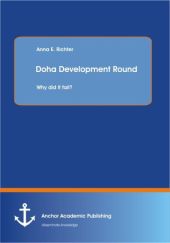 Neuerscheinungen 2014Stand: 2020-02-01 |
Schnellsuche
ISBN/Stichwort/Autor
|
Herderstraße 10
10625 Berlin
Tel.: 030 315 714 16
Fax 030 315 714 14
info@buchspektrum.de |

Anna Richter
Oil in Iraq: How to overcome the Resource Curse?
Erstauflage. 2014. 24 S. 220 mm
Verlag/Jahr: ANCHOR ACADEMIC PUBLISHING 2014
ISBN: 3-9548931-8-5 (3954893185)
Neue ISBN: 978-3-9548931-8-8 (9783954893188)
Preis und Lieferzeit: Bitte klicken
This paper will have a closer look at the overwhelming importance of non-renewable resources for the Iraqi economy and how the profits made by oil exports should be invested to ensure the best possible outcome, in order to finally overcome the resource curse . Channeling oil and gas revenues to lead the charge in generating non-oil based growth is of paramount importance to make the Iraqi economy sustainable in a long run and finally overcoming the resource curse. This implies investments that support economic diversification as a key driver of economic activity through the creation of an enabling environment and investments that remove the binding constraints to growth. While international oil prices remain high, action must be taken.
Text Sample:
Introduction:
This paper will have a closer look at the overwhelming importance of non-renewable resources for the Iraqi economy and how the profits made by oil exports should be invested to ensure the best possible outcome, in order to finally overcome the resource curse .
As found by economic analysis and sector assessments: Iraq s economic, poverty and conflict future will be largely determined by the government s ability to govern the economy in the transparent and better use of oil revenues and establishment of wealth redistribution mechanisms.
In the first chapter the risks for any economy stemming from resource abundance will be assessed, then in section 1.2. the specific challenges for Iraq. In the second chapter, we will have a look at the Macroeconomic environment and specifically at the current oil sector in Iraq in section 2.2.
Finally in the third chapter the recommended steps towards a more inclusive growth path that serves both government and wider societal interests (jobs, transparency, accountability and inclusive growth) will be outlined.
Chapter 1: Resource Curse:
1.1. Definition and implications
The so called resource curse is a widely used term describing the phenomenon that often countries with oil or other natural resource wealth experience slower economic growth. What seems like an counter-intuitive statement at first, was proven widely in a large number of studies. There are several hypothesis to explain how resource abundance is a threat to economic growth:
- most oil producers are price-takers and therefore vulnerable to price-fluctuation. Saudi-Arabia stands out to certain extend, due to its large size in world oil markets. However the assumption generally proves right, especially taking into account the diminishing monopoly of OPEC and its low success in binding its members to their assigned quotas.
- Oil wealth can hit non-oil exports as a result of exchange rate valuation.- An increased budget allows the government to employ more civil servants, to strengthen political support. Oil rich states often find themselves with an exorbitant, inefficient public sector.
- The perspective of Oil wealth can be subject to the whims of various groups leading to structural imbalances, which could potentially fuel further conflict.
Several recent papers suggest that the negative association between natural resource intensity and economic growth can be
reversed if institutional quality is high enough. Therefore the resource curse should not be interpreted as a rule that resource-rich countries are doomed to failure, but rather be perceived as a double-edged sword, with both benefits and dangers. In countries with sufficiently good institutions resource dependency may instead contribute positively to economic growth.
Anna Richter was born in Heidelberg, Germany in 1991.She grew up in Dresden and La Palma (Canary Islands). After graduating from high-school in Spain, Miss Richter studied Arabic studies at the University of Manchester. She studied and researched for one year at the University of Jordan in Amman and travelled extensively. Besides interning at various government institutions she is currently pursuing her Master s degree in Middle Eastern Economics at the Friedrich Alexander University Nuremberg-Erlangen.


